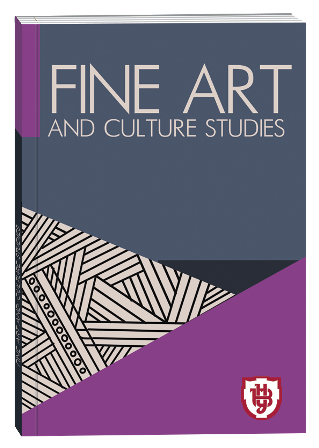UKRAINIAN CHORAL SINGING AS A MEANS OF CONSTRUCTING NATIONAL IDENTITY
DOI:
https://doi.org/10.32782/facs-2023-6-2Keywords:
choral singing, culture, archetype, mentality, national identityAbstract
The purpose of the article – to justify the historical role of choral singing of Ukrainians as an important factor of national self-identification. The research methodology consists of the following methods: scientific-theoretical (when considering scientific works, the focus of which research is concentrated on the concepts of «mentality», «identity»); historical and cultural (when outlining the conditions for the existence and functioning of the national choral culture at various historical stages); systematic (with a holistic study of choral singing as a phenomenon of Ukrainian musical culture); inductive (to reproduce the general picture of Ukrainian choral culture). Scientific novelty. It was revealed that the propensity of the Ukrainian people to group singing is determined not only by anthropological factors, the richness of Ukrainian folk songs, but also by historical, political, social factors and features of the national mentality. It has been proven that choral singing played a major role in the Ukrainian statebuilding process and had a direct impact on the formation of Ukrainian national identity. Conclusions. Taking into account the fact that choral singing in Ukraine has long prevailed over other types of musical performance activity, the characteristic features of the national mentality (introversion, cardiocentricity, emotionality and sensitivity, anarchic individualism on the one hand and collectivism on the other, religiosity, to some extent «decorativeness») are found its vivid expression in the traditions of Ukrainian group singing. Choral singing is one of the most important components of Ukrainian national culture, as the life and cultural system of Ukrainians is connected with it – agricultural traditions, family and church rituals have always been accompanied by joint singing. It is noted that collective music-making, the essence of which is the unification of people in a common creative endeavor, contributes to the construction of Ukrainian national identity, because choral art became a means of «self-revival», «self-display» of the Ukrainian people, contributed to Ukrainians' awareness of themselves as a nation, and represented Ukrainian professional musical art on the international stage.
References
Антонович Д. Українська музика. Українська культура: лекції за редакцією Дмитра Антоновича / упор. С. В. Ульяновська. К.: Либідь, 1993. С. 404–442.
Бермес І. Хоровий спів і ментальність українців. Вісник Прикарпатського університету: Мистецтвознавство. Івано-Франківськ, 2011. Вип. 21–22. С. 319–324.
Бенч-Шокало О. Український хоровий спів. Актуалізація звичаєвої традиції: навч. посіб. К.: ред. журн. «Укр. Світ», 2002. 440 с.
Бенч О. Традиція українського хорового співу. URL: http://umo.edu.ua/images/content/institutes/imp/vydannya/visnyk_umo/pedagogika/5_2020/%D0%91%D0%B5%D0%BD%D1%87.pdf
Візниця Ю. Національна ментальність та риси її українського виміру. URL: https://ukr-socium.org.ua/wp-content/uploads/2010/04/13-19_no-2_vol-33_2010_UKR.pdf
Герасимова-Персидська Н. Хоровий концерт на Україні в XVII–XVIII ст. К.: Муз. Україна, 1978. 182 с.
Граб У. Мирослав Антонович: інтелектуальна біографія. Еміграційне музикознавство в українському культуротворенні повоєнних десятиліть: монографія. Львів: В-во УКУ, 2019. 456 с.
Драганчук В. Відображення національної ментальності у сучасній хоровій музиці на основі трансформованої української пісенності. Наукові записки Тернопільського національного педагогічного університету імені Володимира Гнатюка. Серія: Мистецтвознавство. 2012. № 2. С. 49–53. URL: http://nbuv.gov.ua/UJRN/NZTNPUm_2012_2_10
Драгомирецька О. Творчість Анатолія Авдієвського в контексті української хорової культури: дис. … канд. мист-ва: 17.00.03. Львів, 2016. 206 с.
Ehrismann S. Singen verboten: Gab es das schon mal. URL: https://www.swissinfo.ch/ger/wirtschaft/singenverboten--gab-es-das-schon-mal--/46230270
Козаренко О. Феномен української національної музичної мови. Львів. 2000. 286 с.
Колесса Ф. Музикознавчі праці. Київ: Наукова думка, 1970. 592 c.
Кошиць О. Спогади. Частина 2. Вінніпег, 1948. 272 с.
Куриляк І. Еволюція драматургічних функцій хору в українській опері: національно-естетичний вимір: дис. … канд. мист-ва: 17.00.03. Львів, 2018. 195 с.
Новакович М. Галицька музика габсбурзької доби: у пошуках української ідентичності. Львів: Т. Тетюк, 2019. 376 с.
Пересунько Т. Симон Петлюра інтернаціоналізує українське питання піснею: невідома історія тріумфу «Щедрика» в Європі. URL: https://www.istpravda.com.ua/articles/2020/01/28/156943/
Рудницький А. Українська музика: історично-критичний огляд. Мюнхен: Дніпрова хвиля, 1963. 406 с.
Рудницький А. Про музику і музик. Нью-Йорк, 1980. 336 с.
Синкевич Н. Соціально-архетипове підґрунтя національно-хорового мистецтва. Тернопільський національний університет ім. В. Гнатюка. Серія: Мистецтвознавство. 2012. C. 129–135.
Україна: історія, культура, ментальність: навч. посіб. Уманський держ. пед. ун-т імені Павла Тичини / уклад. О. М. Перепелюк. Умань: Візаві, 2021. 157 с.
Фаунтен Дж. Співоча революція. URL: https://weeklyword.eu/uk/%D1%81%D0%BF%D1%96%D0%B2%D0%BE%D1%87%D0%B0%D1%80%D0%B5%D0%B2%D0%BE%D0%BB%D1%8E%D1%86%D1%96%D1%8F/
Фільц О., Невелюк О. Галицька ментальність. URL: https://zbruc.eu/node/74882
Чижевський Д. Нариси історії філософії на Україні. Нью-Йорк, 1991. 176 с.
Шевельов Ю. Я, мені, мене… (і довкруги). Спогади. Частина перша. В Україні. URL: https://chtyvo.org.ua/authors/Sheveliov_Yurii/Ya_mene_mene_i_dovkruhy_Spohady/
Храмова В. До проблеми української ментальності. Українська душа: зб. наук. праць / відп. ред. В. Храмова. Київ: Фенікс, 1992. С. 3–35.
Шлемкевич М. Душа і пісня. Українська душа: зб. наук. праць / відп. ред. В. Храмова. Київ: Фенікс, 1992. С. 97–112.







